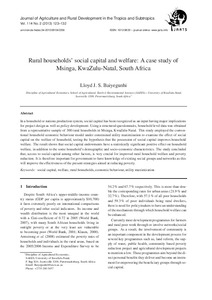Datum
2013Autor
Baiyegunhi, Lloyd J. S.Schlagwort
630 Landwirtschaft, VeterinärmedizinMetadata
Zur Langanzeige
Aufsatz

Rural households’ social capital and welfare: A case study of Msinga, KwaZulu-Natal, South Africa
Zusammenfassung
In a household or nations production system, social capital has been recognized as an input having major implications for project design as well as policy development. Using a structured questionnaire, household level data was obtained from a representative sample of 300 rural households in Msinga, KwaZulu-Natal. This study employed the conventional household economic behaviour model under constrained utility maximisation to examine the effect of social capital on the welfare of household, testing the hypothesis that the possession of social capital improves household welfare. The result shows that social capital endowments have a statistically significant positive effect on household welfare, in addition to the some household’s demographic and socio-economic characteristics. The study concluded that, access to social capital among other factors, is very crucial for improved rural household welfare and poverty reduction. It is therefore important for government to have knowledge of existing social groups and networks as this will improve the effectiveness of the present strategies aimed at reducing poverty.
Zitierform
In: Journal of Agriculture and Rural Development in the Tropics and Subtropics. Kassel : Kassel University Press. - Vol. 114, No. 2 (2013), S. 123-132Sammlung(en)
Vol 114, No 2 (2013) (Journal of Agriculture and Rural Development in the Tropics and Subtropics (JARTS))Zitieren
@article{urn:nbn:de:hebis:34-2013081343356,
author={Baiyegunhi, Lloyd J. S.},
title={Rural households’ social capital and welfare: A case study of Msinga, KwaZulu-Natal, South Africa},
year={2013}
}
0500 Oax 0501 Text $btxt$2rdacontent 0502 Computermedien $bc$2rdacarrier 1100 2013$n2013 1500 1/eng 2050 ##0##urn:nbn:de:hebis:34-2013081343356 3000 Baiyegunhi, Lloyd J. S. 4000 Rural households’ social capital and welfare: A case study of Msinga, KwaZulu-Natal, South Africa / Baiyegunhi, Lloyd J. S. 4030 4060 Online-Ressource 4085 ##0##=u http://nbn-resolving.de/urn:nbn:de:hebis:34-2013081343356=x R 4204 \$dAufsatz 4170 7136 ##0##urn:nbn:de:hebis:34-2013081343356
<resource xsi:schemaLocation="http://datacite.org/schema/kernel-2.2 http://schema.datacite.org/meta/kernel-2.2/metadata.xsd"> 2014-02-03T12:22:52Z 2014-02-03T12:22:52Z 2013 1612-9830 urn:nbn:de:hebis:34-2013081343356 http://hdl.handle.net/123456789/2013081343356 eng Kassel University Press Urheberrechtlich geschützt https://rightsstatements.org/page/InC/1.0/ social capital welfare rural households economic behaviour utility maximization 630 Rural households’ social capital and welfare: A case study of Msinga, KwaZulu-Natal, South Africa Aufsatz In a household or nations production system, social capital has been recognized as an input having major implications for project design as well as policy development. Using a structured questionnaire, household level data was obtained from a representative sample of 300 rural households in Msinga, KwaZulu-Natal. This study employed the conventional household economic behaviour model under constrained utility maximisation to examine the effect of social capital on the welfare of household, testing the hypothesis that the possession of social capital improves household welfare. The result shows that social capital endowments have a statistically significant positive effect on household welfare, in addition to the some household’s demographic and socio-economic characteristics. The study concluded that, access to social capital among other factors, is very crucial for improved rural household welfare and poverty reduction. It is therefore important for government to have knowledge of existing social groups and networks as this will improve the effectiveness of the present strategies aimed at reducing poverty. open access In: Journal of Agriculture and Rural Development in the Tropics and Subtropics. Kassel : Kassel University Press. - Vol. 114, No. 2 (2013), S. 123-132 Baiyegunhi, Lloyd J. S. Gedruckte Ausg. im Verlag Kassel Univ. Press (www.upress.uni-kassel.de) erschienen. </resource>
Die folgenden Lizenzbestimmungen sind mit dieser Ressource verbunden:
Urheberrechtlich geschützt

